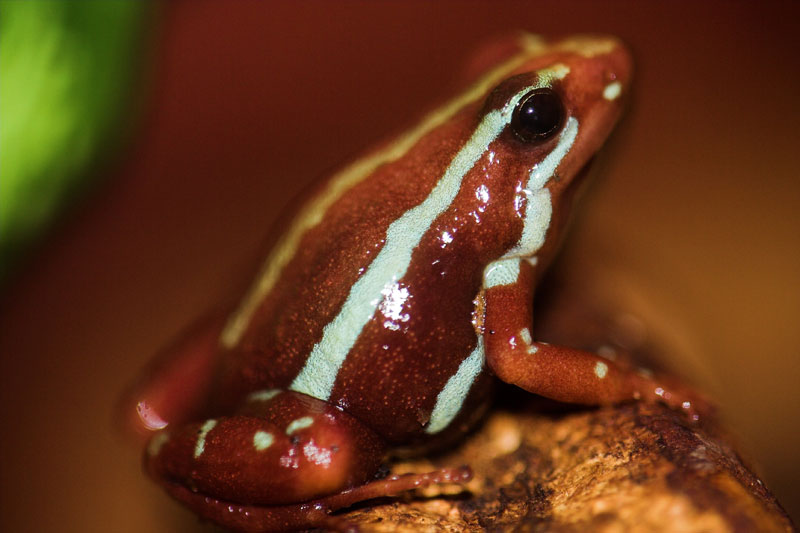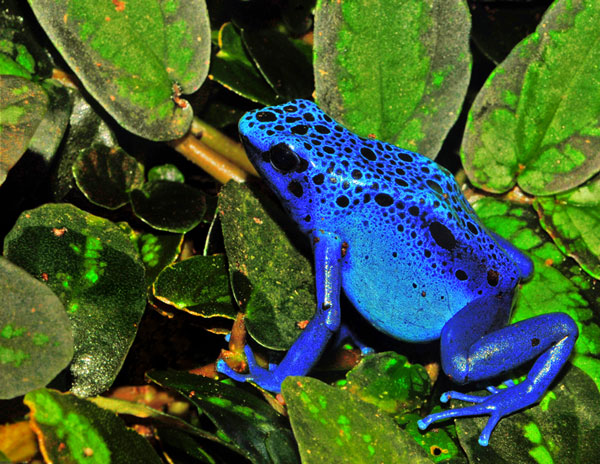Known as the “most poisonous” creature in the world, the poison of the dart frog paralyzes the nervous system, paralyzing muscles and causing death. The venom of a golden frog can kill almost 20 healthy men or even 2 African male elephants.
Venom isn’t just a self-contained weapon you use to attack and neutralize prey in the animal kingdom. Overcoming countless “heavyweight” opponents, this tiny creature is the scariest venom in the world: the fastest creature that can kill people!
That is, the poisonous frog (scientific name: Dendrobatidae) is a group of frogs from the Dendrobatidae family specializing in life in Central and South America.
The reason they are so named is that their venom is used by Indians to leach darts when hunting.
Led by the golden frog (Phyllobates terribilis) in Colombia, is the most poisonous species on the planet. The poison it secretes can kill 10 to 20 males, or 2 male African elephants.
Their skin secretes batrachotoxin, a toxin that paralyzes the nervous system, paralyzes muscles and causes death. The venom of a golden frog can kill almost 20 healthy men or even 2 African male elephants.
This frog has a pretty bright and eye-catching appearance. However, don’t be fooled by this “eye-catching” look because with just a little touch of their skin, the human heart can stop beating quickly.
Compared with other dart frogs such as black frog or dart frog, kokoe poison dart frog (Phyllobates aurotaenia), the toxicity of yellow dart frog is much higher. More frightening, their venom can last up to a year!
If you touch them by hand, that doesn’t mean you could be poisoned through the skin, as they only excrete toxins through the skin when they feel threatened, but not so that you can touch them.
Although the tiny frogs have venom that can kill … elephants, but their ancestors who lived 40-45 million years ago are not poisonous. The reason they can secrete the venom is because they ingest poisonous organisms.
Smaller than the yellow frog, a small black-legged frog or a bicoloured frog (Phyllobates bicolor) in western Colombia killed with only 150 micrograms of the toxin. Poisoned victims will experience fever, pain, seizures, respiratory and muscle paralysis, and then die.
The Kokoe poison dart frog (Phyllobates aurotaenia) is the smallest poison dart frog of the poison dart frog genus. This frog poison can seep through wounds and pores, causing pain, fever, seizures and paralysis. Indigenous Colombians often use its poison to leach hunting arrows.
The tricolor poison frog (Epipedobates tricolor) is only 1/2 inch shorter, but its poison can easily kill predators and humans. This species of frog is now threatened with extinction in Ecuador because it is exploited for the analgesic epibatadine with effects 200 times more powerful than morphine.
Tricolor poisonous frog.
Next is the black frog (Ranitomeya variabilis) living in the rainforest in Ecuador and Peru, has a skin-secreting toxin that can kill 5 people.
The yellow-backed striped frog (Phyllobates vittatus) is one of the four unique genera of dart frogs. But it contains less toxicity, which can cause pain, mild seizures and even paralysis in some cases of poisoning.
The striated dart frog (Phyllobates lugubris) in Central America has a relatively low toxin of 0-0.8 micrograms, but is still capable of causing heart failure in its carnivores.
Although not as deadly as other dart frogs, Dendrobates Azureus is still a species of frog with dangerous toxicity.
Humpback frog darts.
Still part of the famous poison dart frog genus, the red dart frog (Oophaga pumilio) can cause swelling and burning for those who are poisoned.
The red and black poison dart frog (Ranitomeya reticulatus) living in Peru has moderate toxicity, but can kill animals like chickens and injure people.
As the third largest poison dart frog about 2 inches in length, the spotted poison frog (Dendrobates tinctorius) has many different colors containing poison for self-defense. It was used by the tribes to imbue hunting arrows.
Finally, the giant leaf frog (Phyllomedusa bicolor), also known as the monkey frog, has a mild toxin that causes pain, a sick stomach leads to hallucinations when touched. They are currently in danger of extinction due to some of its toxic components which could be used in the treatment of AIDS and cancer.




